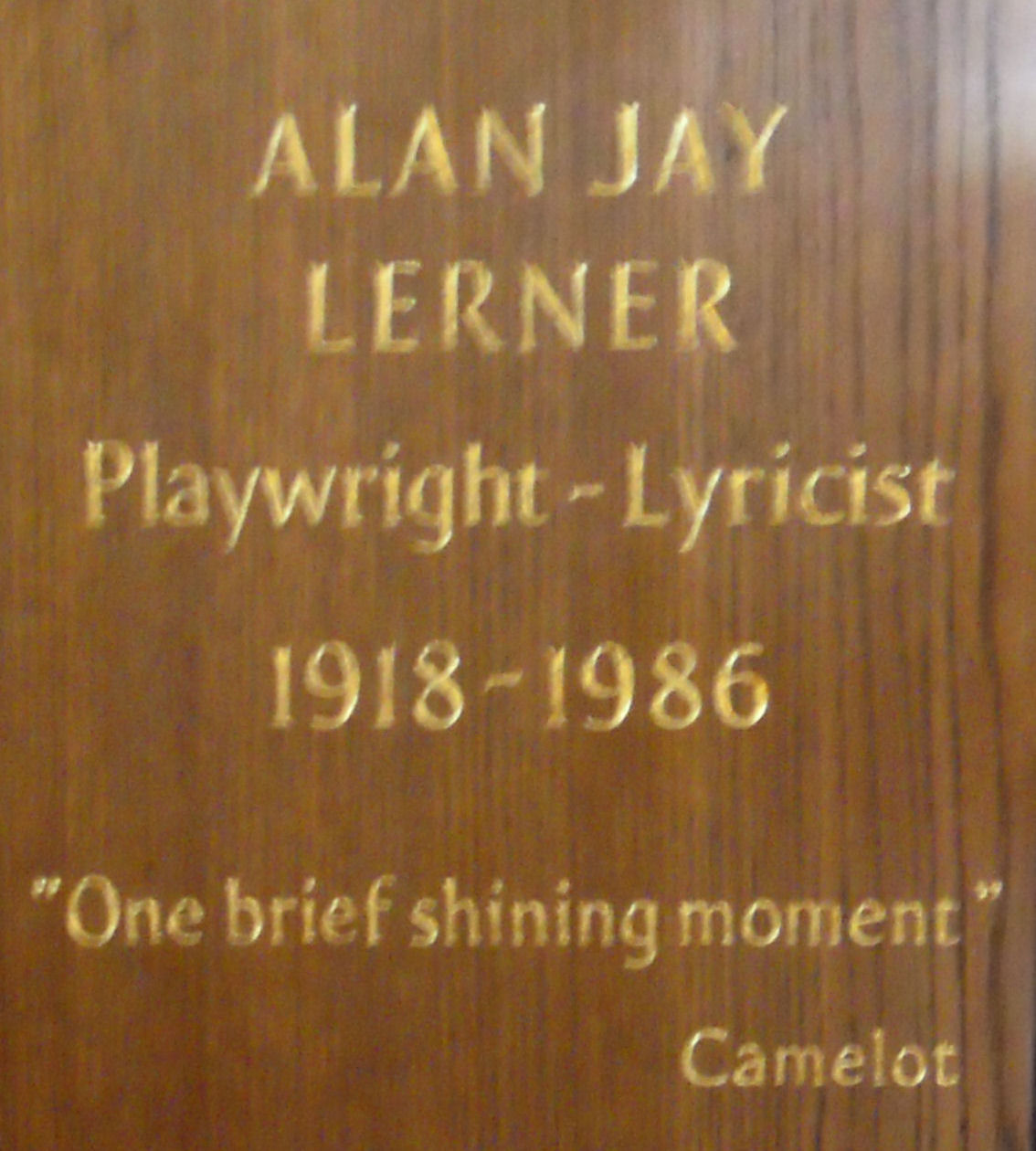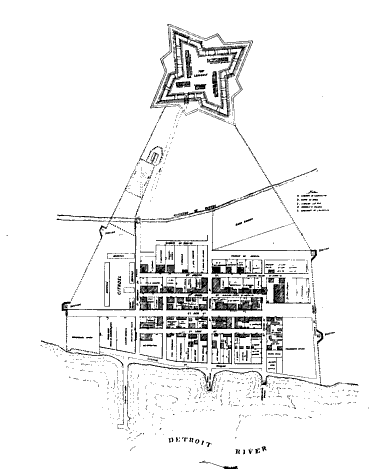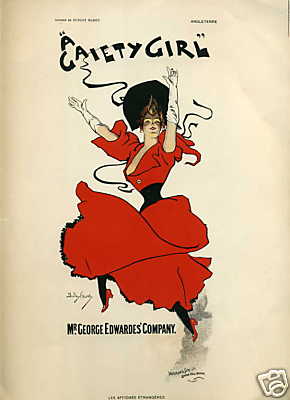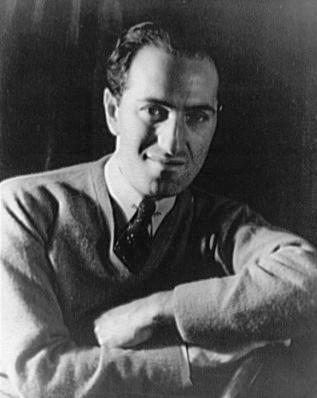|
Life Of The Party (musical)
''Life of the Party'' is a musical with a book and lyrics by Alan Jay Lerner and music by Frederick Loewe. The first of the team's many collaborations, it is a musical adaptation of Barry Connor's farce ''The Patsy''. It was written for a Detroit stock theatre company. The play was performed in October 1942 at the Wilson Theatre, Detroit, and had a run of nine weeks, directed by Russell Filmore and starring Dorothy Stone, Charles Collins, Charles Ruggles and Margaret Dumont. The musical was never staged on Broadway Broadway may refer to: Theatre * Broadway Theatre (other) * Broadway theatre, theatrical productions in professional theatres near Broadway, Manhattan, New York City, U.S. ** Broadway (Manhattan), the street **Broadway Theatre (53rd Stree ....Suskin, Steven."'Life of the Party'"''Show Tunes:The Songs, Shows, and Careers of Broadway's Major Composers'', Oxford University Press US, 2000, , p. 222 References {{Lerner and Loewe 1942 musicals Musicals bas ... [...More Info...] [...Related Items...] OR: [Wikipedia] [Google] [Baidu] |
Musical Theatre
Musical theatre is a form of theatrical performance that combines songs, spoken dialogue, acting and dance. The story and emotional content of a musical – humor, pathos, love, anger – are communicated through words, music, movement and technical aspects of the entertainment as an integrated whole. Although musical theatre overlaps with other theatrical forms like opera and dance, it may be distinguished by the equal importance given to the music as compared with the dialogue, movement and other elements. Since the early 20th century, musical theatre stage works have generally been called, simply, musicals. Although music has been a part of dramatic presentations since ancient times, modern Western musical theatre emerged during the 19th century, with many structural elements established by the works of Gilbert and Sullivan in Britain and those of Harrigan and Hart in America. These were followed by the numerous Edwardian musical comedies and the musical theatre w ... [...More Info...] [...Related Items...] OR: [Wikipedia] [Google] [Baidu] |
Alan Jay Lerner
Alan Jay Lerner (August 31, 1918 – June 14, 1986) was an American lyricist and librettist. In collaboration with Frederick Loewe, and later Burton Lane, he created some of the world's most popular and enduring works of musical theatre both for the stage and on film. He won three Tony Awards and three Academy Awards, among other honors. Early life and education Born in New York City, he was the son of Edith Adelson Lerner and Joseph Jay Lerner, whose brother, Samuel Alexander Lerner, was founder and owner of the Lerner Stores, a chain of dress shops. One of Lerner's cousins was the radio comedian and television game show panelist Henry Morgan (comedian), Henry Morgan. Lerner was educated at Bedales School in England, Choate Rosemary Hall, The Choate School (now Choate Rosemary Hall) in Wallingford, Connecticut, (where he wrote "The Choate Marching Song") and Harvard University, Harvard. He attended both Camp Androscoggin and Camp Greylock. At both Choate and Harvard, Lerner ... [...More Info...] [...Related Items...] OR: [Wikipedia] [Google] [Baidu] |
Frederick Loewe
Frederick Loewe (, originally German Friedrich (Fritz) Löwe ; June 10, 1901 – February 14, 1988) was an Austrian-United States, American composer. He collaborated with lyricist Alan Jay Lerner on a series of Broadway musicals, including ''Brigadoon'', ''Paint Your Wagon (musical), Paint Your Wagon'', ''My Fair Lady'', and ''Camelot (musical), Camelot'', all of which were made into films, as well as the original film musical ''Gigi (1958 film), Gigi'' (1958), which was first Gigi (musical), transferred to the stage in 1973. Biography Loewe was born in Berlin (Charlottenburg), Germany, to Vienna, Viennese parents Edmund and Rosa Loewe. His father was a noted Jewish operetta star who performed throughout Europe and in North America, North and South America; he starred as Count Danilo in the 1906 Berlin production of ''The Merry Widow''. Loewe grew up in Berlin and attended a Prussian cadet school from the age of five until he was thirteen. At an early age Loewe learned to play ... [...More Info...] [...Related Items...] OR: [Wikipedia] [Google] [Baidu] |
Farce
Farce is a comedy that seeks to entertain an audience through situations that are highly exaggerated, extravagant, ridiculous, absurd, and improbable. Farce is also characterized by heavy use of physical humor; the use of deliberate absurdity or nonsense; satire, parody, and mockery of real-life situations, people, events, and interactions; unlikely and humorous instances of miscommunication; ludicrous, improbable, and exaggerated characters; and broadly stylized performances. Genre Despite involving absurd situations and characters, the genre generally maintains at least a slight degree of realism and narrative continuity within the context of the irrational or ludicrous situations, often distinguishing it from completely absurdist or fantastical genres. Farces are often episodic or short in duration, often being set in one specific location where all events occur. Farces have historically been performed for the stage and film. Historical context The term ''farce'' is deri ... [...More Info...] [...Related Items...] OR: [Wikipedia] [Google] [Baidu] |
Detroit
Detroit ( , ; , ) is the largest city in the U.S. state of Michigan. It is also the largest U.S. city on the United States–Canada border, and the seat of government of Wayne County. The City of Detroit had a population of 639,111 at the 2020 census, making it the 27th-most populous city in the United States. The metropolitan area, known as Metro Detroit, is home to 4.3 million people, making it the second-largest in the Midwest after the Chicago metropolitan area, and the 14th-largest in the United States. Regarded as a major cultural center, Detroit is known for its contributions to music, art, architecture and design, in addition to its historical automotive background. ''Time'' named Detroit as one of the fifty World's Greatest Places of 2022 to explore. Detroit is a major port on the Detroit River, one of the four major straits that connect the Great Lakes system to the Saint Lawrence Seaway. The City of Detroit anchors the second-largest regional economy in t ... [...More Info...] [...Related Items...] OR: [Wikipedia] [Google] [Baidu] |
Charles Ruggles
Charles Sherman Ruggles (February 8, 1886 – December 23, 1970) was an American comic character actor. In a career spanning six decades, Ruggles appeared in close to 100 feature films, often in mild-mannered and comic roles. He was also the elder brother of director, producer, and silent film actor Wesley Ruggles (1889–1972). Career Ruggles was born in Los Angeles, California, in 1886. Despite training to be a doctor, Ruggles soon found himself on the stage, appearing in a stock production of ''Nathan Hale'' in 1905. At Los Angeles's Majestic Theatre, he played Private Jo Files in L. Frank Baum and Louis F. Gottschalk's musical ''The Tik-Tok Man of Oz'' in 1913. He moved to Broadway to appear in '' Help Wanted'' in 1914. His first screen role came in the silent ''Peer Gynt'' the following year. Throughout the 1910s and 1920s, Ruggles continued to appear in silent movies, though his passion remained the stage, appearing in long-running productions such as ''The Passing Show ... [...More Info...] [...Related Items...] OR: [Wikipedia] [Google] [Baidu] |
Margaret Dumont
Margaret Dumont (born Daisy Juliette Baker; October 20, 1882 – March 6, 1965) was an American stage and film actress. She is best remembered as the comic foil to the Marx Brothers in seven of their films; Groucho Marx called her "practically the fifth Marx brother." Early life Dumont was born Daisy Juliette Baker in Brooklyn, New York, the daughter of William and Harriet Anna (née Harvey) Baker. Her mother was a music teacher and encouraged Daisy's singing career from an early age. Career Dumont trained as an operatic singer and actress in her teens and began performing on stage in the US and Europe, at first under the name Daisy Dumont and later as Margaret (or Marguerite - French for Daisy) Dumont. Her theatrical debut was in ''Sleeping Beauty and the Beast'' at the Chestnut Theater in Philadelphia; in August 1902, two months before her 20th birthday, she appeared as a singer/comedian in a vaudeville act in Atlantic City. The dark-haired soubrette, described by a theater ... [...More Info...] [...Related Items...] OR: [Wikipedia] [Google] [Baidu] |
Broadway Theatre
Broadway theatre,Although ''theater'' is generally the spelling for this common noun in the United States (see American and British English spelling differences), 130 of the 144 extant and extinct Broadway venues use (used) the spelling ''Theatre'' as the proper noun in their names (12 others used neither), with many performers and trade groups for live dramatic presentations also using the spelling ''theatre''. or Broadway, are the theatrical performances presented in the 41 professional theatres, each with 500 or more seats, located in the Theater District and the Lincoln Center along Broadway, in Midtown Manhattan, New York City. Broadway and London's West End together represent the highest commercial level of live theater in the English-speaking world. While the thoroughfare is eponymous with the district and its collection of 41 theaters, and it is also closely identified with Times Square, only three of the theaters are located on Broadway itself (namely the Broadwa ... [...More Info...] [...Related Items...] OR: [Wikipedia] [Google] [Baidu] |
1942 Musicals
Year 194 ( CXCIV) was a common year starting on Tuesday (link will display the full calendar) of the Julian calendar. At the time, it was known as the Year of the Consulship of Septimius and Septimius (or, less frequently, year 947 '' Ab urbe condita''). The denomination 194 for this year has been used since the early medieval period, when the Anno Domini calendar era became the prevalent method in Europe for naming years. Events By place Roman Empire * Emperor Septimius Severus and Decimus Clodius Septimius Albinus Caesar become Roman Consuls. * Battle of Issus: Septimius Severus marches with his army (12 legions) to Cilicia, and defeats Pescennius Niger, Roman governor of Syria. Pescennius retreats to Antioch Antioch on the Orontes (; grc-gre, Ἀντιόχεια ἡ ἐπὶ Ὀρόντου, ''Antiókheia hē epì Oróntou'', Learned ; also Syrian Antioch) grc-koi, Ἀντιόχεια ἡ ἐπὶ Ὀρόντου; or Ἀντιόχεια ἡ ἐπ� ..., and ... [...More Info...] [...Related Items...] OR: [Wikipedia] [Google] [Baidu] |
Musicals Based On Plays
Musical theatre is a form of theatrical performance that combines songs, spoken dialogue, acting and dance. The story and emotional content of a musical – humor, pathos, love, anger – are communicated through words, music, movement and technical aspects of the entertainment as an integrated whole. Although musical theatre overlaps with other theatrical forms like opera and dance, it may be distinguished by the equal importance given to the music as compared with the dialogue, movement and other elements. Since the early 20th century, musical theatre stage works have generally been called, simply, musicals. Although music has been a part of dramatic presentations since ancient times, modern Western musical theatre emerged during the 19th century, with many structural elements established by the works of Gilbert and Sullivan in Britain and those of Harrigan and Hart in America. These were followed by the numerous Edwardian musical comedies and the musical theatre w ... [...More Info...] [...Related Items...] OR: [Wikipedia] [Google] [Baidu] |
Musicals By Alan Jay Lerner
Musical theatre is a form of theatrical performance that combines songs, spoken dialogue, acting and dance. The story and emotional content of a musical – humor, pathos, love, anger – are communicated through words, music, movement and technical aspects of the entertainment as an integrated whole. Although musical theatre overlaps with other theatrical forms like opera and dance, it may be distinguished by the equal importance given to the music as compared with the dialogue, movement and other elements. Since the early 20th century, musical theatre stage works have generally been called, simply, musicals. Although music has been a part of dramatic presentations since ancient times, modern Western musical theatre emerged during the 19th century, with many structural elements established by the works of Gilbert and Sullivan in Britain and those of Harrigan and Hart in America. These were followed by the numerous Edwardian musical comedies and the musical theatre w ... [...More Info...] [...Related Items...] OR: [Wikipedia] [Google] [Baidu] |


.jpg)



